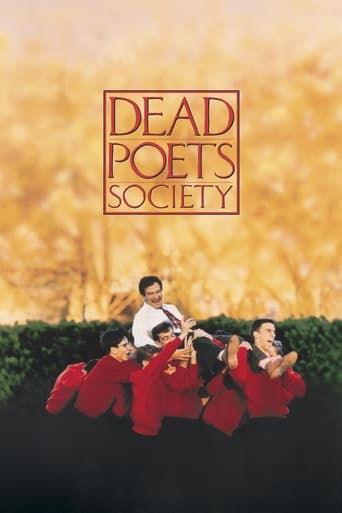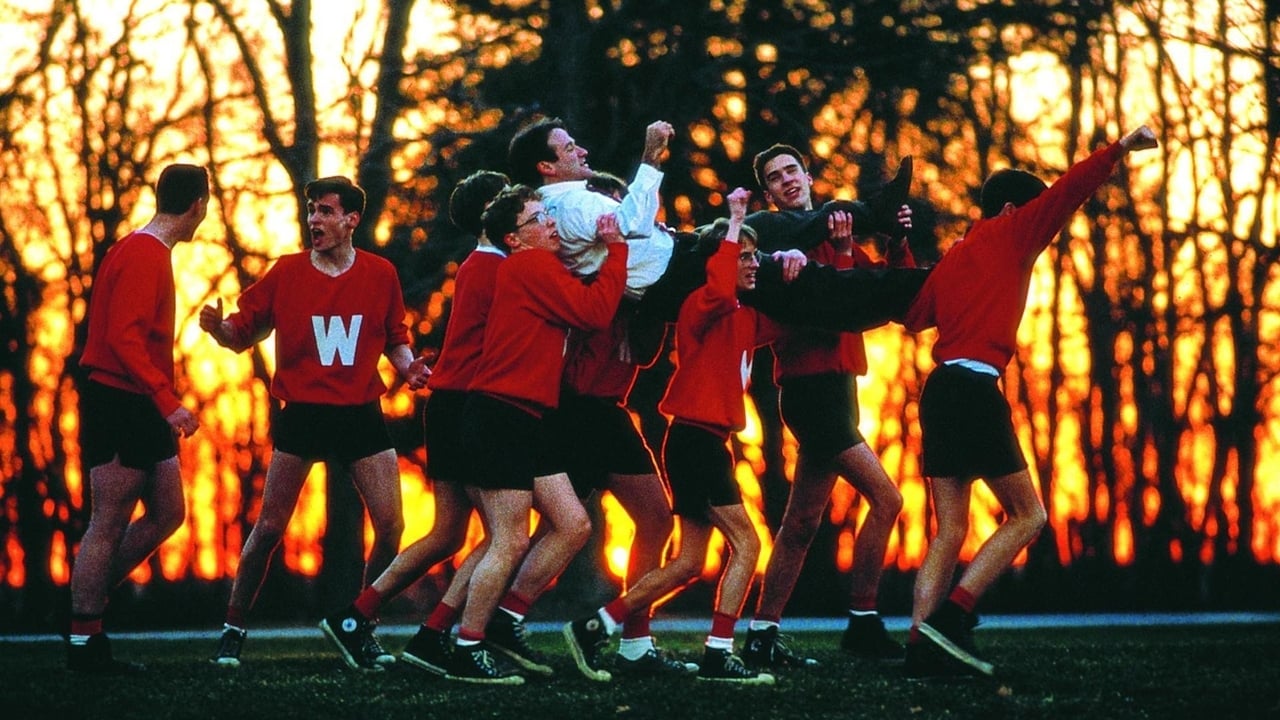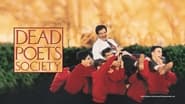Conall McCormick
I find it ironic that I am attempting to provide a, largely, objective assessment of this film; a task which the film's main character, John Keating, a poetry teacher, would view with derision. His personal philosophy is that poetry (and by extension, I imagine, all other forms of art e.g. filmmaking) should be viewed entirely subjectively. That art cannot, or should not, be objectively scrutinised but that the importance of any piece of art is in the emotions that it may evoke in its audience members. The reaction of the audience member to any piece of art is, of course, unique to the individual and that is where the value truly lies. Keating's intellectual adversary in this film is the author of the "Introduction to Poetry" Mr Pritchard. His assessment of poetry is cold and detached, believing that poetry can be objectively assessed like a mathematical formula in order to determine its importance. This dogmatic view is, naturally, in the same line of thinking as the strict, prestigious school that the film takes place in. The school is seen to be ruthless in the application and preservation of this soulless mentality which indoctrinates its students. It is, of course, the clash of these contradictory ideologies which creates the central conflict of the narrative. However, I do have major disagreements with how this conflict is presented in this film. Namely, that the film is rather simple in its assessment of this rather complex issue and presents it in a black and white fashion. Keating is seen as the hero of the narrative and his philosophy is presented as, ironically, the objective truth in the overall question. I feel that the school and, the figure of Mr Pritchard, come across as quite exaggeratory and caricatural in the examination of the opposing philosophy. As an agnostic nihilist I understand that life is meaningless and that the only option humans have is to ascribe meaning to whatever we deem appropriate. That is to say that, to the fullest extent, Mr Keating is 100% correct in his worldview. That the examination of art IS entirely subjective because there can be no objective standard. On the other hand, the strict adherence to this worldview is, I find, extremely problematic. There may not be an objective standard for the arts or to the meaning in life but humans do need that structure to exist as a society AND to adequately assess the arts. I think to prove this point I think one merely needs to look at the modern art scene. The current school of thought that "anything is art" also means that "nothing is art" as a consequence. It's a sad state of affairs when an unmade bed can LITERALLY be deemed as a work of art and can be perceived as being of equal worth as, say, the ceiling of the Sistine chapel. Under Keating's worldview the two are inherently (but more importantly readily PERCIEVED) to be equitable since there is no objective standard (other than what one ascribes). This is what, I feel, has led to the degradation of modern art where the skill and artistry derived from objective standards and tutelage in the past has been lost/overlooked. Indeed, in the film Keating is faced with the problems of his own ideology. One of the students produces a poem that reads "The cat sat on the mat" which mockingly exposes the flaws of his philosophy. One of his students becomes quite anarchic when he buys fully into Keating's worldview only to be (arguably hypocritically) reprimanded by Keating himself for his actions. To further illustrate this point I shall use another example. With nihilism, and the lack of objective meaning, there is no reason WHY a man couldn't kill another man if he felt like it (if he knew he could get away with it) as there is no reason why he should or shouldn't do so. Naturally, the reader of this review understands this to be an "objective wrong" as that is the reality of the society we have been conditioned by. Therefore, that obejctivity exists (if not in the truest sense). Ultimately, Keating is correct in that the reason we have the arts is for the emotions that they evoke in us and the value that we ascribe to them. There are plenty of "objectively" bad movies that I love but the fact that they are objectively flawed doesn't hinder my enjoyment of them. However, I do think that the acknowledgment of these flaws is of crucial importance. In short, to justify my ACTUAL review of this film (which I haven't even STARTED yet!) I first had to tackle its underlying philosophy to explain the legitimacy of my objective assessment. Yes, it is true that any piece of art (be it poetry, filmmaking etc) is entirely subjective to the fullest extent. However, practically speaking, it is really more of a mix between the objective and the subjective; even if the objective is merely a delusion which we (as a society) collectively endorse. With that lengthy explanation in mind I can now identify what I understand to be the objective assessment of this film. I think that, before attributing one's subjective value onto a film, a baseline must be set determined on the objective success (or failure) of a film on a technical level. This film is around the 7/10 mark (i.e. a "good" film) as far as I'm concerned. I can certainly understand why people would give it between a 5 ("average") and an 8 ("great") out of 10 as this is where the grey area lies as to the range out emotional investment and subjective assessment exists. However, to give this film any higher or lower (I think) lacks real insight into the strengths, or limitations, of this work.To begin with, I feel that the narrative was solid and enjoyable. The dialouge inparticular is its greatest quality and produces some really great interactions between characters. The character of Mr Keating (played by the late-great Robin Williams) is the centrepiece of the film and the source of its wise and insightful dialouge. Williams is more witheld in this film than his other films but this only serves to create an enigmatic aura around his character. He exudes a great warmth and passion which is made readily evident. Its a good performance but certainly not his best ("Good Will Hunting") as his character doesn't have a great deal more depth beyond his role as an educator and mentor to expose weaknesses in his character. The limitation of the film is that the story is very predicatable and there was no point when I was thrown off track. The change in events that occur in this film is down to the shifting motivations of the students. Of the large group, three are of prime focus: Neil, who feels oppressed by his father, Todd, who is experiences problems with his introversion and Knox, who is too shy to talk to the woman he loves. By these brief explanations of these three protagonists you can almost already figure out what the end result will be. This is largely what prevents the film from ever attempting to reach a higher threshold of significance. Despite the limited scope of the narritive this is beneficial to the film in the fact that it keeps it well contained and is as clear and concise as it could have been. I'd say that the antagonists in the film (being the principal and Neil's father, among others) are very one-dimensional and don't really enhance the story greatly. However, since the overall point of the film is to challenge and resist conformity it is, perhaps, beneficial in a much broader wider context with this in mind. The performances from the extended cast (beyond Robin) are very good and for a film that really depends on the strength of its young actors does a terrific job.The direction for the film is decent and there is some interesting cinematography, namely in one classroom scene which provokes a suitably nauseating and disorienting experience for the viewer which puts us firmly in the shoes of one of the characters expertly. However, the cinematography and direction (at least from a visual standpoint) does not reach a "great" level of quality. To conclude, I shall now talk about the subjective experience I had when watching this film. It is easily understood why so many people have such an endearment towards this film. Its message is simple. "SEIZE THE DAY!" is the Keating's mantra as he implores his students (and more importantly the audience) to make the most of their lives. It is a remarkably simple message, but it is one which is not readily appreciated in day-to-day life in modern society. It is easy to see why people are so affected by this film as they face the humdrum monotony of daily living. I think a criticism which people have of this film is that some of the characters (namely the students) come across as quite pretentious. Whilst I can certainly see WHY people may have this perception, I don't think it is an accurate one. Mr Keating's ambition for the children is for them to be able to think for themselves, nothing more, nothing less. Mr Keating is helping the students start their journey to self-discovery but does not presume to hold the answers. Other than the issues I have with the conflicting ideologies (which I identified earlier in length) I feel that the film deals with its themes and subject matter adequately. As the film's final scene highlights, there will be people who will be deeply inspired by this film and there will be those who will scoff and will deem it to be overly sentimental. I can appreciate the opinions of both in regards to this film but I think that, ultimately, there is enough quality in this film to justify the 7/10 rating from myself.
audrablum
This week I chose to watch a dramedy called Dead Poets Society (1989). The logline reads "English teacher John Keating inspires his students to look at poetry with a different perspective of authentic knowledge and feelings." The movie made me feel inspired as an artist. At its core the story embraces Shakespeare's line "to thine own self be true." In this story John Keating, the new English teacher exercises unconventional methods to help the students grasps their individual senses of artistic freedom and the importance of not being governed by others rather embracing one's own identity and desires. Through a series of ups and downs the students have to come to terms with the depths of what that means. The story made me think about how important it is for people to be accepting of one another, especially for parents to accept their children no matter how different they are. The movie also reminded me that each person just might define success differently. A parent may see success in career and financial status whereas a son may see success as penniless but enjoying his or her career.
I think the story writing here was brilliant. The ideas were strongly conveyed through the dialogue script and even paid tribute to its poetic theme by using such things as irony, foil, and foreshadowing techniques. The acting was great too. Obviously Robin Williams stole the show, but he younger men were quite talented. The directing was great and mostly felt seamless. The pacing seemed a little slow to me at some points, and some of the cave scenes reminded me of The Breakfast Club (1985). The movie was made by Touchstone Pictures so of course it was professional quality. I liked the use of lighting and there were definite moments of contrast where the lighting was used to highlight the inner "dark thoughts" in certain moments. Overall, I loved the film and wish I would have seen it sooner.
L_Copa
I was surprised by the great act of my lovely Robert Sean Leonard, Ethan Hawke and of course Robin Williams. This movie is so powerful and emotional. It makes you think so many things for life, for situations, people and many more. It holds you till its latest scene. Is is like a true story of the old decades, what was like back then and how it is now. You can learn so many things from this great scenario. You will be motivated by this movie and maybe you'll learn a thing or two about poetry.
yaquidrl
There is a lot to like about the movie. Cinematography, characterizations, actors, etc. I really liked how it leaves you feeling for Keating's character at the end, while also in many ways arguing against his actions. The Latin teacher and principal are respectful and cordial. Their positions are more level headed. After all, Keating's student kills himself, when he could have waited a year and become an actor. He would have been an "adult" in no time. He couldn't wait. I have to be an actor now or die. I can understand feeling that way if your parents are telling you you can't be who you want to be. But suicide? The other students are reckless too. They're young. They're not as capable of thinking long term. They're doing stuff that's risking expulsion... stupid stuff, that could negatively impact the rest of their lives. They don't have as much experience. Anyway, that's why i liked the movie. Did really well developing that central question of how much freedom and responsibility 17 years can handle. How much critical reasoning can they do and should it be encouraged? Hard to say, I think.



 AD
AD








